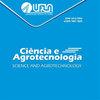Artichoke leaf extracts: Proteolytic activity, coagulant and HPLC analysis
IF 0.9
4区 农林科学
Q2 AGRICULTURE, MULTIDISCIPLINARY
引用次数: 2
Abstract
ABSTRACT The search for origin plant-based proteases increases gradually due to their diversity and stability over a wide range of pH and temperature. Artichoke (Cynara scolymus) flowers are a proteolytic vegetable source already studied, but their leaves are scarce in this respect. Thus, the objective of this research was to obtain extracts of artichoke leaves with different buffers and extraction methods as an alternative proteolytic source and plant coagulant, as well as the separation and comparison of the protein profile of these extracts. The methodology used was based on extraction with sodium citrate buffer (pH 3), sodium acetate (pH 5) and Tris-HCl (pH 7) by mechanical stirrer (MS) and ultrasound (US); protein determination; proteolytic activity (PA) and specific activity (SA); milk clotting activity (MCA) and rennet substitution potential (RSP); high- performance liquid chromatography analysis (HPLC) with UV-Vis detector and principal component analysis (PCA). Extracts of Cynara scolymus leaves showed high results with Citrate-US for the parameters PA (14.38), SA (19.71), MCA (440) and RSP (30.60) compared to other treatments. The extracts with citrate and acetate presented a quick coagulation time (max 3 min). The HPLC analysis enabled the separation of the different protein compounds present in the extracts and most expressive peaks in the samples with Citrate-MS and Acetate-MS; and isolated peaks for Citrate-US. It was concluded that extracts of artichoke leaves with citrate and acetate buffer attributed satisfactory results to act as plant coagulant, as well as to carry out further studies for the purification of proteolytic enzymes and application in cheeses.朝鲜蓟叶提取物:蛋白水解活性、凝固剂和高效液相色谱分析
摘要:由于植物蛋白酶在pH和温度范围内的多样性和稳定性,对其来源的探索逐渐增加。朝鲜蓟(Cynara scolymus)花是一种已经研究过的蛋白水解蔬菜来源,但它们的叶子在这方面很少。因此,本研究的目的是获得具有不同缓冲液和提取方法的洋蓟叶提取物,作为替代蛋白水解源和植物凝结剂,并对这些提取物的蛋白质图谱进行分离和比较。所使用的方法基于通过机械搅拌器(MS)和超声波(US)用柠檬酸钠缓冲液(pH 3)、乙酸钠(pH 5)和Tris-HCl(pH 7)提取;蛋白质测定;蛋白水解活性(PA)和比活性(SA);牛奶凝固活性(MCA)和凝乳酶替代潜力(RSP);采用紫外-可见光谱检测器和主成分分析法进行高效液相色谱分析。与其他处理相比,Cynara scolymus叶提取物在参数PA(14.38)、SA(19.71)、MCA(440)和RSP(30.60)方面显示出柠檬酸盐US的高结果。柠檬酸盐和乙酸盐提取物具有快速凝结时间(最长3分钟)。HPLC分析能够用柠檬酸盐MS和乙酸盐MS分离提取物中存在的不同蛋白质化合物和样品中最具表达性的峰;柠檬酸盐US的分离峰。结果表明,柠檬酸盐和乙酸盐缓冲液对洋蓟叶提取物具有良好的促凝剂作用,并对蛋白水解酶的纯化和在干酪中的应用进行了进一步的研究。
本文章由计算机程序翻译,如有差异,请以英文原文为准。
求助全文
约1分钟内获得全文
求助全文
来源期刊

Ciencia E Agrotecnologia
农林科学-农业综合
CiteScore
2.30
自引率
9.10%
发文量
19
审稿时长
6-12 weeks
期刊介绍:
A Ciência e Agrotecnologia, editada a cada 2 meses pela Editora da Universidade Federal de Lavras (UFLA), publica artigos científicos de interesse agropecuário elaborados por membros da comunidade científica nacional e internacional.
A revista é distribuída em âmbito nacional e internacional para bibliotecas de Faculdades, Universidades e Instituições de Pesquisa.
 求助内容:
求助内容: 应助结果提醒方式:
应助结果提醒方式:


